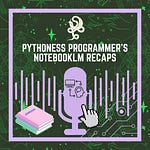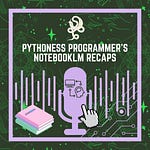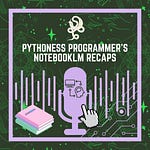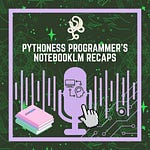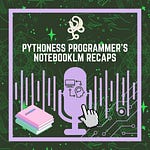Show Notes
Ever feel like the digital landscape is less a playground and more an escape room with a time limit? This week, the Pythoness Programmer team picks apart the highs, lows, and emotional plot twists behind AI’s rapid evolution. From email assistants that debug before you blink, to language models shaping how we talk, to the deep itch of limerence and the surprising need to be witnessed—this episode bridges code, creativity, neurodivergence, and the fine art of staying human as the world rewires itself.
Featured Articles
AI Fixed My Code Before I Could [Every Staff, Every.to]
The New AI Operating System of Work—Goodbye Docs, Hello Executable Artifacts [Nate B. Jones, Substack]
AI Is Eliminating Jobs for Younger Workers [Will Knight, Wired]
Can AI Write Creatively? It Depends Who’s Reading. [Rhea Purohit, Every.to]
In Search Of AI Psychosis [Scott Alexander, Astral Codex Ten]
neural networks are changing our vibes [Adam Aleksic, Substack]
Why You Can’t Stop Thinking About Them (And It’s Not Love) [Lindsey Mackereth, Substack]
Why I Don’t Create for Myself Alone [Aura 3.0, Substack]
Episode Highlights
What does it mean to work with, not just around, AI? Meet the new “operating system” of work: tools that enforce clarity, minimize admin, and leave more room for brainpower and coffee breaks.
Is AI helping or replacing? A new Stanford study reveals surprising age divides as automation reconfigures entire industries—especially entry-level tech.
Can algorithms really channel creativity, or are they just really diligent remixers? We dig into the messy, meaning-making magic humans still bring to the creative process (and what remains beyond the reach of even the shiniest model).
From “AI psychosis” to the subtle flattening of language, real talk about mental health, neurodivergence, and the importance of collective meaning-making online and off.
Limerence decoded: that bittersweet cocktail of fixated attention isn’t (just) a bug—it can be a source of healing, insight, and creative energy, especially for neurospicy minds.
Why making art isn’t a solo act: memory lives on not just with the maker, but in the community who witnesses and carries stories forward.
Key Takeaways
Tech should empower, not exhaust. Mindful automation, clear boundaries, and collective stewardship are the antidotes to burnout.
Neurodivergent perspectives aren’t a fringe case—they’re a blueprint for adaptability and resourcefulness in fast-changing times.
Connection matters: being witnessed, not just producing, is fundamental to human flourishing (and better tech).
Reflection Prompt
Which part of today’s episode—AI creativity, neurocomplexity, or the deep need to be seen—resonated or rattled you most? How is technology changing your relationship to your own work, energy, or story?






